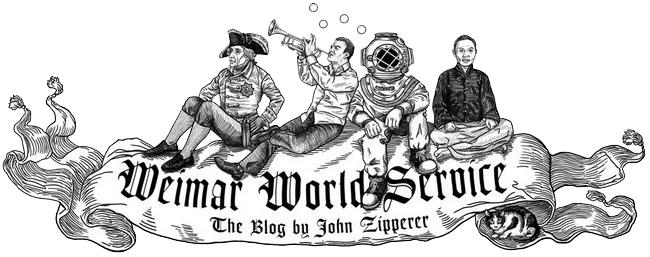I don’t think he was necessarily trying to keep his life a secret; when I asked him about it, he said he was open about it at conventions, so fans knew. But I don’t think most of his readers attended conventions all that much, so the majority of us were left to read between the lines.
One of the articles between whose lines we read were the publisher’s column in this issue of Starlog, in which he praises the diversity and talent and tragedy represented by the mammoth AIDS quilt (technically, The NAMES Project Quilt). “Once in a while, ... I write about something which is unrelated to science fiction,” O’Quinn writes. “I do that because I believe that filling a mind only with arts and entertainment produces an unrealistic view of life – and because I believe that anyone who is truly concerned about the world of tomorrow must be aware of all components of that world. I believe that Starlog can help you to become more sensitive to the full human experience.”
I hope he feels that his mission was accomplished.
Oh, and you don’t need to read between any lines any longer to know the truth about Kerry O’Quinn today.
Starlog #139
76 pages (including covers)
Cover price: $3.50
Even Starlog’s editor David McDonnell occasionally chided his magazine for covering every last detail about Star Trek. Sometimes, I think it went too far (I’m not sure I needed to read an interview with every person who played a walk-on part in an episode of Star Trek’s original series). But other times, it really provided good, in-depth coverage that made for interesting reading as well as giving readers a better sense about how the movie and TV worlds work. The articles on the aborted Star Trek II TV series in #136 were good examples. This issue, those efforts continue.
The rundown: Star Trek: The Next Generation’s second-season cast (that’s minus Denise Crosby and Gates McFadden, but plus Diana Muldaur) is featured on the cover. Kerry O’Quinn’s From the Bridge relates his journey to Washington, D.C., to see the AIDS quilt; reader letters in Communications react to censorship debates, defend William Shatner, dissect Sylvester McCoy’s Doctor Who characterization, praise articles on The Green Hornet and The Prisoner, and more; Medialog includes Marc Shapiro on Rod Serling’s posthumous star on the Hollywood Walk of Fame, and David McDonnell’s roundup of genre news, such as the info that Gates McFadden, having left Star Trek: The Next Generation, has joined ABC’s daytime soap opera All My Children.
Edward Gross extends his coverage of the Star Trek II TV project with an interview of David Gautreaux, who had been signed to play a new Vulcan regular on the show but ended up with a bit part as a human on Star Trek: The Motion Picture; in the Fan Network pages, Jon E. Heitland reports on Riverside, Iowa, which is proud of its status as the “future birthplace of Captain James Kirk,” and short news items announce a new Phantom of the Opera fanzine, an attempt to connect Soviet and North American science-fiction fans, and more; speaking of Phantom, Jean-Marc and Randy Lofficier explore the work of Phantom’s creator, Gaston Leroux; and Lynne Stephens reports on Phantom on the stage.
Ian Spelling interviews Martin Landau, who talks about his role in the George Lucas/Francis Ford Coppola film Tucker, as well as Space: 1999; in the first of a multi-part article, Bill Warren chats with screenwriter Nigel Kneale about The Quatermass Experiment and other works; David McDonnell interviews actor Patrick Stewart, who was in his second year of his iconic role as Captain Picard; David Kyle explains the work of science-fiction writer E.E. “Doc” Smith; Tom Weaver completes his two-part interview with former Superman co-star Phyllis Coates; Fangoria editor Anthony Timpone previews the new TV show Superboy: The Series; Margaret A. Baroski profiles actor Gareth Thomas about his work in Blake’s 7; Michael Wolff, dubbed the magazine’s “interplanetary corespondent,” dissects Predator; Marc Shapiro interviews Willow screenwriter Bob Dolman; David Hutchison’s Videolog column lists the new genre releases; and in his Liner Notes column, David McDonnell gets a little silly explaining some recent things, but then he notes that Comics Scene magazine is moving from a quarterly to a bimonthly publishing schedule and will now be offering subscriptions, and he tells readers to use the subscription form on the next page – unfortunately, as these things go, the ad hasn’t been updated yet and still carries the note for Comics Scene that “No subscription available.”
“When I was first cast as Xon, a fair amount of the fans reacted very strangely. Somebody recently told me that actors in soap operas place themselves in serious jeopardy if [in the show] they antagonize the fans’ favorite character. They, the actors on the street, can become the object of the fans’ wrath. That does happen in this business. When Star Trek II was announced and I was essentially announced as the replacement for Spock, I received some really strange letters from people saying, ‘Don’t drink the water,’ or somebody was going to drop LSD in my Coca-Cola. It was like poison pen letters because Spock was God to these people.”
–David Gautreaux, actor, interviewed by Edward Gross: “Casualty of the Lost Generation”To read previous Starlog issue descriptions, click on "Starlog Internet Archive Project" in the keywords below or visit the Starlog Project's permanent home.




No comments:
Post a Comment